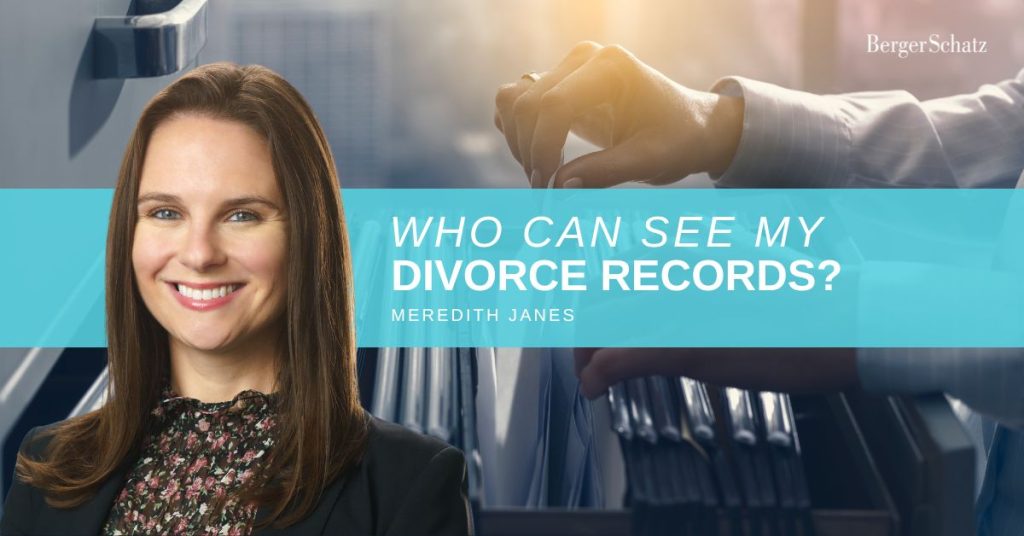
Illinois divorce records are generally public record. These records are available for all to see. Divorce records often include personal information that could potentially be damaging to you or your spouse. In limited circumstances, a party’s privacy concerns may justify sealing the divorce file from public view. Alternatively, there are steps your lawyers can take to limit the inclusion of your personal information in the public record.
Meredith Janes explains everything you need to know about divorce records, and the steps you can take to protect your privacy.
What are divorce records?
Divorce records are held with the clerk of the circuit court where the divorce takes place. The record can include details and private information about each party within the pleadings and motions, responses thereto, orders, and final Judgment. This private information may include information about a party’s income, financial information, medical information, and details of the parties and their children that one would not want anybody to know.
How can someone access my divorce records?
To access divorce records, a request can be made through the circuit court of the county in which the divorce is pending or was granted.
The Illinois Clerks of Courts Act states: “All records, dockets and books required by law to be kept by such clerks shall be deemed public records and shall at all times be open to inspection without fee or reward, and all persons shall have free access for inspection and examination to such records, docket and books, and also to all papers on file in different clerks’ offices and shall have the right to take memoranda and abstracts thereto.” 705 ILCS 105/16(6).
Why would someone want to look at my divorce records?
There are various reasons why someone may access divorce records in the state of Illinois.
- Financial – Financial institutions may ask to see a final financial agreement for lending purposes. Particularly, if one party does not have a reliable stream of income absent support from their ex-spouse.
- Curiosity – Sometimes people want to look at divorce records out of curiosity or for an improper purpose.
Can I seal my divorce records?
Courts are hesitant to seal public records and it is often difficult to convince a court to do so. The default position in Illinois is that all records and files required kept by the clerk of the circuit court are public records that can always be accessed by the public. This is because the law recognizes the public’s interest in transparency in judicial proceedings. If a party wishes to seal his or her divorce records, he or she must establish that there is a compelling interest to restrict access.
People may try to have their divorce records sealed if it is in the best interests of the child. There must be compelling evidence that the sealing would protect the personal safety or well-being of the child.
Another example is the disclosure of medical or mental health information if a party believes that that information could be improperly used against them. It is the court’s job to balance the requesting party’s right to privacy and the public’s right to access this information.
Other than sealing my divorce records, what steps can I take to protect my privacy?
When going through a divorce there are steps you can take to help keep private information out of the public record, short of sealing the file.
You and your spouse can:
- Incorporate your settlement agreement “by reference” in the final judgment to ensure the details of your financial settlement remain private. This means that the settlement agreement stays out of the public record.
- You can attach exhibits containing private information to pleadings “by reference” so that they are not part of the public record.
- Alternatives to litigation such as mediation ensure personal information remains private and out of the public record.
Divorce is personal, and information about your children, your health, and your finances, to name a few, are matters you likely want to keep private. An experienced divorce attorney can help protect your privacy and take measures to ensure pertinent information remains private.
Learn more about Meredith Janes and contact her at mjanes@bergerschatz.com.